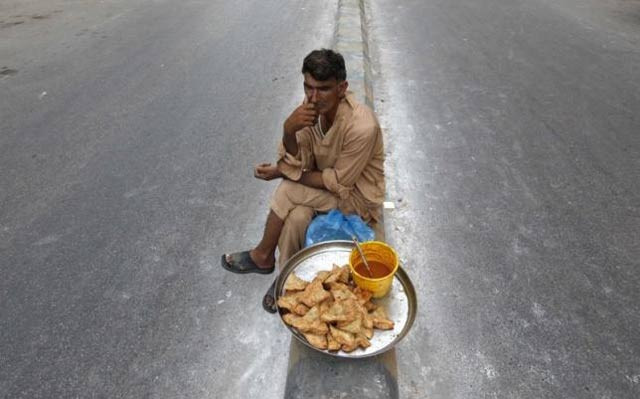Litany of economic woes left unaddressed
Claiming to secure better revenues, the government has failed in promoting exports, agriculture, industry

Claiming to secure better revenues, the government has failed in promoting exports, agriculture, industry. PHOTO: REUTERS
Opponents of the government; especially Imran Khan and his team have been arguing that Nawaz government’s claims of progress are fake.
Economic growth likely to touch 7% next year: Dar
They point at the rising prices of goods, commodities and services, poor health and education networks, neglect of public health engineering and the sky-rocketing unemployment.
Neither the government nor its opponents touch upon the real issues in the economy though, and that is the real issue requiring an in-depth analysis. The Mall Road of Lahore has been abuzz with farmers’ protests for the past few months while entrepreneurs and investors have been complaining of hardships in maintaining and expanding their businesses.
The farmers, investors and entrepreneurs’ worries stay unaddressed and the government appears to be unmindful of the outcome of neglect with which it treats these basic areas of the economy.
Cost of doing business and conducting farming has been on the rise in the face of estate development boom, rise in the unemployment and input costs. The present government failed to chart out a functional industrial policy and agriculture-development strategy.
Over the past couple of years, the government has been eulogizing the prospects of China-Pakistan Economic Corridor (CPEC), with prognostications that it would trigger an industrial boom. However, as Ahsan Iqbal, federal minister for Planning and Development, told this scribe, the CPEC is not expected to produce an infrastructure for such development before 2020.
It would not be before 2025 that investors would be attracted by this infrastructure. From the start of 2017 to 2025 (eight years), the government would need a transitional policy for ensuring maximum possible development in the industrial and agriculture sectors.
Economic Survey 2015-16: Off target, once again
Such a policy is nowhere on the horizon.
Not seen doing something meaningful on these two fronts, the government invites the ire of its opponents. Not that the opposition leaders are more capable of addressing these two fronts with a better performance, the reality exists that the failure of Nawaz government to act on emergency footing on these fronts is bound to trigger a process of deterioration.
The government claims that it is securing better revenues than the past but it cannot claim that it has done something productive in promoting exports, agriculture and industrial sectors, in public health engineering, education and reduction in unemployment.
Some analysts would find this situation from the angle of political failure of the Nawaz government, but it is in fact the failure of Pakistan which results in the irreparable weakness of its fundamentals. The top issue in the economy is the depletion of its fundamentals as Pakistan is not producing better farmland and industrial management at the policy levels and the government fails to improve the due facilitation in these spheres.
Such facilitation is vital, as the west and the United States, Japan and China, even India has attained progress on policy facilitation.
Why do recurring governments fail to undertake such facilitation?
This question is most important in the political economy sphere. Talk to politicians and they would say the political governments do not exercise authority since they do not have it and that the elected governments cannot chart out and implement policies of long-term development without authority. Talk to political economists and they would say that neither military, half-military nor the political governments have been oriented on long-term policymaking culture and that is the real issue.
Politicians say they cannot perform without fuller authority to exercise in the fundamental spheres. Political economists say the politicians do not make efforts for clinching the authority required to undertake long-term development.
A large part of the media persistently argues that politicians are corrupt and they would never think of transparency and long-term development, the twin goals that are critical in national transformation.
Economic stability: 'Reforms in agriculture sector will boost economy'
Pakistan has lately been striving for a national consensus for a successful counterterrorism policy. There has been partial but definite success on this front.
It is high time that the all sides came together to evolve a consensus on long-term development of Pakistan and a policy that ensures it.
Again, there are two views on this issue. One is that such a consensus cannot be achieved without initiating a dialogue. The other is that there is no motivation for initiating such a discourse in the first place.
Tangled in such a situation, Pakistan needs a national debate both in politics and in the media.
I think there are quite a number of political activists and media persons who can come forward to initiate this process. If they fail to initiate it for another couple of years, the situation of Pakistan is bound to deteriorate in the economic and political management spheres even further.
The writer has worked with major newspapers and specialises in the analysis of public finance and geo-economics of terrorism
Published in The Express Tribune, October 3rd, 2016.
Like Business on Facebook, follow @TribuneBiz on Twitter to stay informed and join in the conversation.



















COMMENTS
Comments are moderated and generally will be posted if they are on-topic and not abusive.
For more information, please see our Comments FAQ